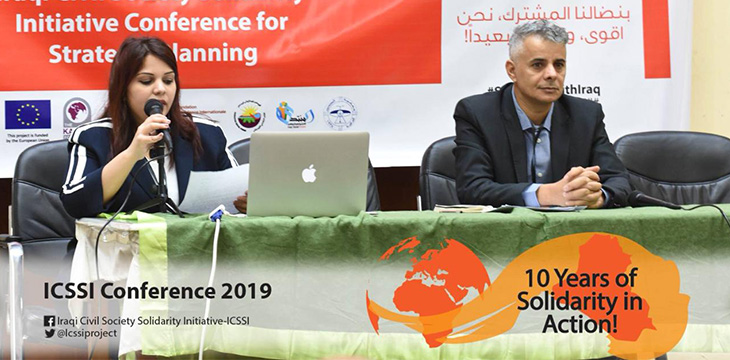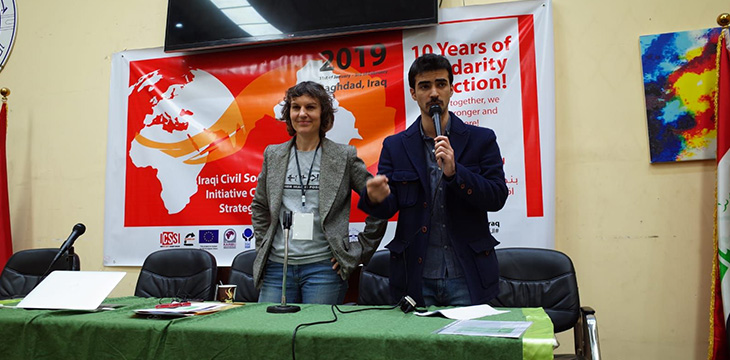Iraq. 10 years of solidarity in action
Not since the 2003 demonstrations against the war in Iraq has Baghdad hosted so many international activists without armed guards, in the so called ‘red zone’, they are here to show their solidarity with Iraqi human rights activists. Times have changed so now a long term collaboration with the Iraqis is possible. Central areas of Baghdad, like Karada, are now fairly safe and a vibrant civil society is working every day with young men and women on advocacy with the institutions, promoting campaigns with slogans such as “We can change Iraq!”

In order to celebrate 10 years of solidarity with civil society activism, the Iraqi Civil Society Solidarity Initiative (ICSSI) has organized a 4-day conference and a series of strategic meetings from 31st January to 3rd February. ICSSI has brought together 185 Iraqis and 41 internationals representing 15 countries, triggering lively debate in the plenary sessions and working groups, with a focus on the main challenges facing Iraqi society today.
This international coalition, founded in Italy in 2009 things to a joint Iraqi-Italian initiative between NGOs, social movements and trade unions, held its annual meeting in Baghdad for the first time ever. By building strong links throughout Iraqi Civil Society, the conference highlighted the vital progress already made by Iraqi activists, men and women, on the most important issues (also known as ‘paths’ or ‘masarat’ in Arabic).
The mend women activists working on these issues – including protection of the environment and water resources; women’s participation and leadership;Sport and art against violence; social and economic rights; workers’ rights, and many more – achievements and challenges were explored. All this effort and the incredible activism of the young men and women, represent one of Iraq’s vital strengths.
The conference participants underlined the shared problems faced by Iraq’s men and women activists. Protest movements from Basra and Sulaymaniyah regularly face repression and violence from armed groups supported by political factions. In this country, many human rights activists are in danger, and are asking the international community to be on their side and support them. The unions, meanwhile, are appealing to the international community to defend freedom of association and the right to strike, as they suffered terrible repercussions since protesting against salary cuts – as recently happened in the car industry.

One of the main problems faced by Iraq is an environmental and water crisis. Pollution caused by the oil companies in the south, drought and global warming, together with construction of huge dams by Turkey and Iran, have had a devastating impact on Iraq’s water resources. The government’s inadequate water management policies and the lack of any regional strategy have exacerbated the crisis and increased the suffering of the Iraqi population. These issues will be discussed at the up-coming water-themed Social Forum in Sulaymaniyah in April 2019.
The Iraqi education system is another new focus of the ICSSI activists.Independent surveys have shown that 40% of boys and girls do not continue beyond primary school. One reason is poverty, which forces boys and girls to leave school to start working to provide for their families. Activists questioned the privatisation of the Iraqi schools and universities, noting the correlation between these phenomena. Ensuring that boys and girls can go to school, requires changes and strengthening of Iraqi labour laws, in order to prevent child labour and give more power to the unions, so they can defend all workers.
Peace building and social cohesion are vital to civil society, and must be promoted through grassroots dialogue and reconciliation initiatives, together with special peace building training for the youth so they can use sport and art to mix with other communities. Social Cohesion Councils have been created in 4 govern orates, a pilot project designed to create spaces where civil society can interact with local authorities on human rights and reconciliation between communities. The activists have announced their plan to organise a Social Forum on Peace in Mosul, in spring 2019, as an opportunity to discuss the discrimination faced by families suspected of being affiliated with Daesh.
Often these are women and children who cannot return home, despite never having supported Daesh or its ideology. Activists underline the fact that “Even if you had a member of Daesh in your family, it doesn’t mean that you are a member of Daesh!”.
